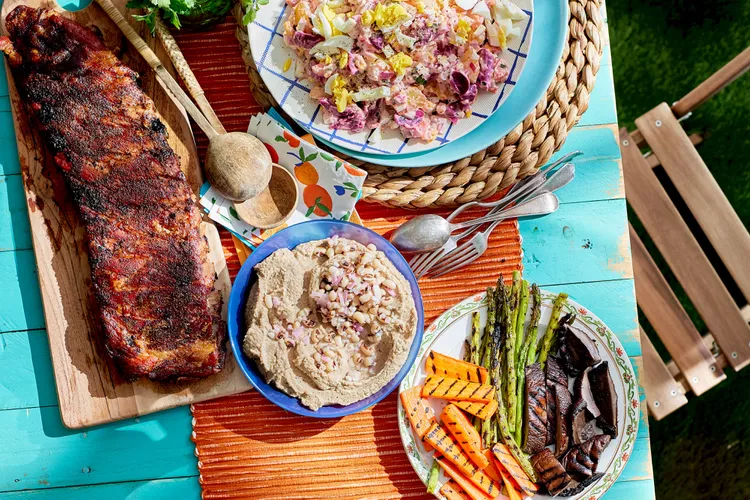Freedom Flavors: Try These Chefs' Juneteenth Recipes for This Year's Celebration

Black culture is food, and food invites people into a conversation with one another and with history. Cybille’s and my family business is a neighborhood café, but we also see it as a place to share a bigger story for people to consume, more than just food. The food is a conduit of truth, and our space is an arena for exchanging stories and ideas.
- Omar Tate and Cybille St.Aude-Tate are driving a conversation about Black culture in food beyond their café Honeysuckle Provisions through dinner parties, pop-ups, and events. In 2020, Omar was named Esquire magazine’s Chef of the Year. Cybille is a Haitian-American chef and holds a degree in African American studies with a focus on Caribbean culture and aesthetics.
What Is Juneteenth?
Commemorating the emancipation of enslaved Black people in the United States, the Juneteenth holiday originated in Texas, where the celebrations are at their most authentic. We did not grow up with the holiday’s traditions, but as the awareness of its celebration has grown, we see it as an opportunity to honor its meaning and importance in Black culture with our families and community.
Our Juneteenth menu blends flavors from Philly and Cybille’s Haitian roots with Southern Black traditions. These dishes highlight the resilience, joy, and power of a people while celebrating the ingredients that reflect the fullness of our ancestry.
Creating Our Juneteenth Menu
Historically Juneteenth celebrations in the South center around pit-cooked barbecue. Our Juneteenth menu includes side dishes and sweets that share chapters of the Black American experience beyond the traumas of enslavement and colonization. They highlight the resilience, joy, and power of a people while celebrating the ingredients that reflect the fullness of our ancestry.
Salad Russe (Haitian Potato Salad)
Caribbean foods reflect the influence of European and African traditions. That’s how a creamy “Russian” potato salad evolved into a beloved Haitian dish. This pink-hued spin combines pickled beets, sweet pickle relish, eggs, carrots, and potatoes.
Black-Eyed Pea Hummus
In the café, we swap chickpeas for purple-eyed peas (a cousin of the black-eyed pea) and add bay leaf, thyme, and miso for a unique savory flavor. Various field peas, such as the purple and black-eyed peas, were transported from West Africa to the Americas by way of the transatlantic slave trade.
Pikliz Pimiento Cheese
Our pimento cheese dip is spiked with crunchy pikliz—a vinegar-based Haitian condiment made with Scotch bonnet peppers, carrots, and cabbage—and our own Creole spice blend that illustrates the melding of cultures reflected in beloved Southern dishes.
Benne Chocolate Pinwheel Cookies
Benne seeds are an heirloom variety of sesame and are core to South Carolina’s Gullah Geechee cuisine. Our not-too-sweet shortbread spiral cookie is made from two doughs, one flavored with chocolate and one flavored with the nutty, buttery benne seeds.
Omar Tate
The color red symbolizing blood sed by our ancestors also speaks to the color as a symbol of strength and spiritual significance that predates the slave trade.
Red Drink Water Ice
Red Drink is a Juneteenth tradition. Our homage is a twist on Philadelphia’s signature water ice, a slushy frozen fruit dessert. The texture is soft and scoopable—not as fine as an Italian ice but not as coarse as an icy granita. Though the classic color for the drink may come from hibiscus, red soda, or Kool-Aid, here we blended fresh strawberries with a homemade strawberry syrup.